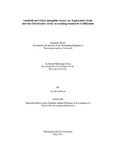| dc.rights.license | In Copyright | en_US |
| dc.creator | Bryan, Lee E. | |
| dc.date.accessioned | 2017-06-19T13:24:49Z | |
| dc.date.available | 2017-06-19T13:24:49Z | |
| dc.date.created | 2017 | |
| dc.identifier | WLURG38_Bryan_ACCT_2017 | |
| dc.identifier.uri | http://hdl.handle.net/11021/33899 | |
| dc.description | Thesis; [FULL-TEXT FREELY AVAILABLE ONLINE] | en_US |
| dc.description | Lee E. Bryan is a member of the Class of 2017 of Washington and Lee University. | en_US |
| dc.description.abstract | Financial statements are one of the primary tools used to assess a company's performance and financial health. Maintaining clear financial statements is important not only for the company itself but also for other stakeholders, such as agencies and investors. To regulate classification, valuation, and disclosure practices for financial matters, entities are required to abide by authoritative U.S. generally accepted accounting principles (U.S. GAAP), as set forth in the Accounting Standards Codification (ASC or Codification). Before 2009, there was a hierarchy for selecting accounting principles to be used in preparing financial statements, including issuances beyond statements made by the Financial Accounting Standards Board (FASB). Applicable literature was difficult to access given the multitude of policy boards releasing statements. In 2009, the Financial Accounting Standards Board introduced the Accounting Standards Codification as the “single official source of authoritative, nongovernmental U.S. generally accepted accounting principles.” Producing the Codification was a major undertaking involving more than 200 individuals and taking over five years to complete. However, the introduction of the Codification was a successful milestone in accounting standards. With this structural overhaul, all authoritative U.S. GAAP can be easily accessed in one spot, reducing time and complexity in financial reporting. [From Introduction] | en_US |
| dc.description.statementofresponsibility | Lee Ellen Bryan | |
| dc.format.extent | 45 pages | en_US |
| dc.language.iso | en_US | en_US |
| dc.rights | This material is made available for use in research, teaching, and private study, pursuant to U.S. Copyright law. The user assumes full responsibility for any use of the materials, including but not limited to, infringement of copyright and publication rights of reproduced materials. Any materials used should be fully credited with the source. | en_US |
| dc.rights.uri | http://rightsstatements.org/vocab/InC/1.0/ | en_US |
| dc.subject.other | Washington and Lee University -- Honors in Accounting | en_US |
| dc.title | Goodwill and Other Intangible Assets: An Exploratory Study into the Effectiveness of the Accounting Standards Codification (thesis) | en_US |
| dc.type | Text | en_US |
| dcterms.isPartOf | RG38 - Student Papers | |
| dc.rights.holder | Bryan, Lee E. | |
| dc.subject.fast | Accounting -- Standards | en_US |
| dc.subject.fast | Financial Accounting Standards Board | en_US |
| dc.subject.fast | Goodwill (Commerce) -- Accounting | en_US |
| dc.subject.fast | Intangible property -- Accounting | en_US |
| local.department | Accounting | en_US |
| local.scholarshiptype | Honors Thesis | en_US |
